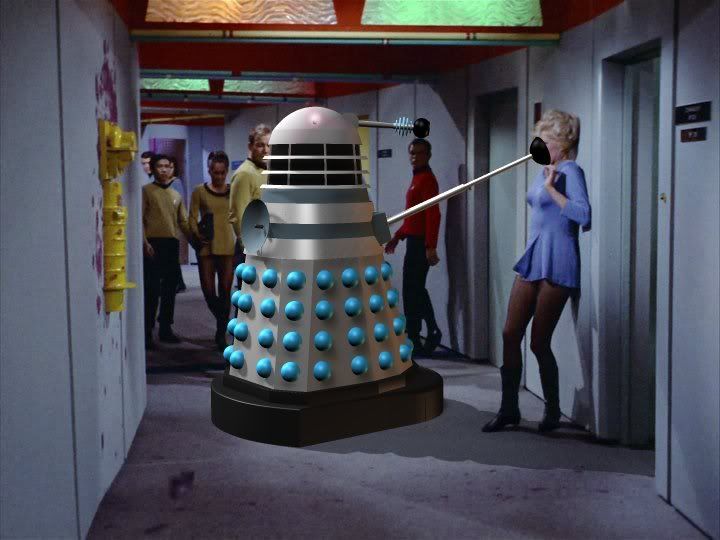I disagree, there was until the 2005 seriesas others have said, there is no concept of an officially sanctioned canon in Doctor Who
Indeed? Could you point me towards it please?
I disagree, there was until the 2005 seriesas others have said, there is no concept of an officially sanctioned canon in Doctor Who
The tv series itself had barely established that the Doctor was alien at this point.
The tv series itself had barely established that the Doctor was alien at this point.
Huh? The Doctor stated quite clearly in An Unearthly Child he was from another planet.


That doesn't mean that he's not an advanced human from a future civilization or colony world. The Doctor refers to himself as a human being in "The Savages" for example, and in "The Evil of the Daleks", it's implied that the Doctor has become more than human only by virtue of his extensive time travelling. The whole Time Lord thing wasn't established until later.
By virtue of being a remake of a story or stories already told within the series proper - like, say the relationship between Never Say Never Again and Thunderball - I would say that the Cushing movies clearly fall outside the continuity and canon of DW proper.
They are, of course, an interesting addition to the DW universe or multiverse. A sort of apocryphal legend, I'd say.
Sure, just go and watch classic Who.I disagree, there was until the 2005 seriesas others have said, there is no concept of an officially sanctioned canon in Doctor Who
Indeed? Could you point me towards it please?
Still, how is it relevant? It may be true that the makers of the Cushing movies had no reason not to make the Doctor human at the time. But it is also true that the Doctor has been defined as an alien for the past 44 years at least, so there's still no way to reconcile the movies with the series continuity as it now stands.
And even at the time, the continuities were clearly different, since he wasn't a person who came from another world and another time and was known only as the Doctor, but was a present-day English inventor named Dr. Who.
Absolutely no harm at all. That's always been my point. The very concept of Doctor Who allows us to accept multiple timelines and parallel realities as standard, so why's this different?And really, what's wrong with that? It's all make-believe anyway, so where's the harm in doing different, incompatible interpretations of a fictional premise?
Sure, just go and watch classic Who.
My point is far more evident when you take into account that Moffat has literally had events in his series erase prior timelines to support the theory that there is no canon.
Well, I deny it. Yes, not in the same timeline, where have I suggested they were? But there's only one Doctor Who - let's face it, he's been depicted with eleven different characters in the tv series alone. What's one more alternative version?Whether there's a canon or not, in this sense it's undeniably true that the Cushing films were not part of the same universe or time line as the television series, nor were they depicting the same character.
Bzzz! Incorrect! You're quoting the unscreened pilot version there. Naughty...Also, in An Unearthly Child:
"We are not of this race. We are not of this earth. Susan and I are wanderers in the fourth dimension of time and space."

And even at the time, the continuities were clearly different, since he wasn't a person who came from another world and another time and was known only as the Doctor, but was a present-day English inventor named Dr. Who.
I suppose it depends how you define 'canon.'
But like Christopher says, it's all fantasy anyway, so does it really matter? Besides, IMHO, some 'non-canon' stuff from any series or franchise can be more entertaining than the canon stuff. Many of the Treklit novels for example.
I suppose it depends how you define 'canon.' Sherlock Holmes fans use it to mean novels written by Conan Doyle. The Bible means the 4 gospels of Matthew, Mark, Luke and John.
If you apply the same sort of criteria to DW, I would argue that the likes of books, radio dramas, DW unbound and the Cushing movies fall outside the definition of canon, no matter how influential they have proven to be or how well they fit in within the continuity of the series.
Everybody should do what I do and just choose their own canon.
The show contradicts itself so many times that trying to argue there is any "official canon" is pretty pointless.
Thankfully JJ Abrams had the dignity to remove his own story (Minus Romulus destruction and vanishing Spock!) from the Trek canon without me having to.
The term "canon" is predominantly used in nerd circles to refer to official continuity.
We use essential cookies to make this site work, and optional cookies to enhance your experience.
